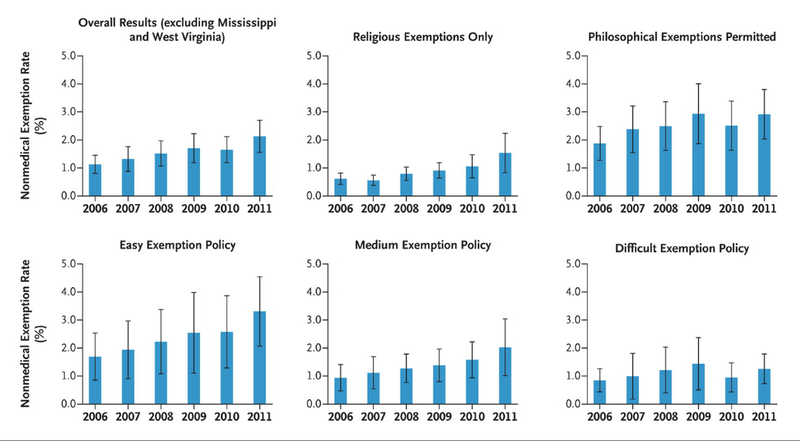FA16 Immunization Module’s Updates
Public Policy Hurdles for Vaccine Generation and Administration
While most Americans benefit from the principles of herd immunity, there is a growing segment of the population that opposes vaccination.
The underlying principles of many people’s vaccination refusal is a distrust of healthcare providers and of the American government. The United States Constitution outlines the powers held by the federal government and distributes all other “police powers,” including laws surrounding immunization, to the states.
Federal vaccination policy dates back to 1955, when Congress appropriated $53.6 million for states to purchase polio vaccine to inoculate children and pregnant women for free. After the success in protecting the population against polio, the federal government expanded its program to take on diphtheria, pertussis, tetanus, and measles. Despite the increased scope of grant provisions, Congress has never passed federal bills regarding vaccine requirements and future bills are unlikely to pass because such requirements are considered outside of Congress’ Constitutional powers. Even so, the courts have generally protected public schools’ policies of refusing students who have not completed their vaccination series. These rulings have given rise to one of the anti-vaccination movement’s core arguments: that vaccination requirements are governmental intrusions into private family life and violate civil liberties. Therefore, distrust of government can play a significant role in the argument against vaccination, especially since, as of 2013, only 19% of American citizens reportedly trust the government to do what is right always or most of the time, down from 73% in 1958. In fact, recent survey data provides evidence that people who distrust the government do refuse vaccination more often, have increased concern that vaccines cause harm, seek alternative medicine providers more often, and obtain their vaccination information from nongovernmental, nonscientific sources more often than those who do not distrust the government.
Essentially, there is a group of people who distrust the government and this group tends to avoid vaccination more frequently. Since they already distrust scientific and authoritative figures, additional PSAs, pamphlets, and CDC information is not likely to convince them to vaccinate themselves or their children. Thus, research into new effective techniques for delivering pro-vaccine messages is necessary. Furthermore, government and healthcare workers need to assess the reasons behind people’s distrust of such institutions in an attempt to break down existing barriers and communication failures. Furthermore, peer advocacy groups may prove effective at convincing people who distrust authority to believe in the safety and efficacy of recommended or required vaccinations.
Sources:
http://dukespace.lib.duke.edu/dspace/bitstream/handle/10161/9286/holsti_citations_revised.pdf?sequence=6



Hey Matthew! This is a very interesting topic, and those graphs provide insight into a changing dynamic in regards to opinions on vaccinations. I think it would be really cool to see the data from the past few years as well, just because there has been so much talk about associating MMR with autism. I think adding these figures and some articles pro- and against- vaccination could make an interesting all around picture. I did my update on vaccine storage and handling. Seeing these graphs makes me wonder what guidelines will change in storage if there are less people getting vaccines. The CDC runs a pretty tight ship in regards to handling vaccines, but I bet something will change if these trends continue. All in all, pretty cool stuff!